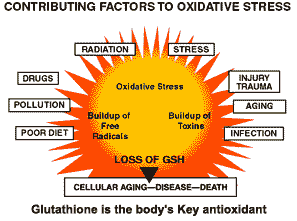
Over the past few months I've heard 3 different podcasts interviewing 3 different guests Dave Asprey, Dr. Jack Kruse and Dr. Mark Gordon. All three guests spoke at length about the many benefits of supplementing with Glutathione and two of the guest said that if they could only recommend 1 supplement that everyone should take it would be Glutathione. That's a pretty strong statement. I would expect them to say something like "you just cant beat a good multivitamin" or the popular "probiotics and gut health...........". But no, they choose Glutathione to hang there hats on and went on to make convincing arguments. I paid attention the first time I heard it. I thought about looking into it a little more the second time I heard it and when the 3rd occasion came up I bought it.
The claims of what Glutathione can do or treat run the gamut, but here are the basics on Glutathione's role in the body. After all, it is made by the liver for a reason:
- Our bodies produce it as an anti-oxidant/ detoxifier primarily but we never have enough because it is constantly being depleted due to high demand that is caused by all of the various toxins we are bombarded with on a daily basis. Glutathione is constantly called on to bind and remove oxidation, boost the immune system, detoxify the body from toxins, suppress inflammation, transport amino acids around the body, regulate the bodies response to injury, activate certain enzymes, repair DNA and direct the synthesis of proteins.
Between what I read and what I originally heard on those podcasts I bought a bottle of 500mg Glutathione. I took it and will continue to take it daily until the bottle is gone. I don't suspect that I will feel anything from taking it per se but I do think I am helping to clean up many years of ignorance and perhaps build a defense against future problems. I think the proper way to take a supplement like this would be a couple bottles a year. One bottle should last 2 months and I figure doing that twice a year would be reasonable. To take it year round would be pricey as each bottle is in the $25- $50 range. I have read that it has amazing powers to clear up things like hangovers and although those are a rarity for me I like having a bottle around just in case.
The only negative I have read about Glutathione is in the debate between how it is best taken for maximal absorption. Some say inhaling it in powder form or injecting it is the only way it can be taken as oral consumption does not allow for much absorption. This is debated on many forums by what seem to be Arm Chair Doctors. The real Doctors I have listened to made no mention of this problem when referring to the Glutathione pills they were taking orally. As with most supplements, I suppose I am erring on the side of caution. I like what I've heard. It makes sense to me. I'm willing to give it a try. I may never know if it was a benefit to me or not. Perhaps I will notice a change in how I feel once my bottle runs out? We shall see. Stayed tuned for my follow up post on Glutathione, the bottle should run out about mid March.


You should be taking glutathione in a liposomal form. The best one is called "ReadiSorb". They have an information site *www.lipoglut.com* that will continue to convince you how important glutathione is. But not the capsules you purchased, sorry to say.
ReplyDeleteThere is a *studies* section on that site that includes abstracts from articles that have been written about their product. How often do you find a dietary supplement that has been studied and reported on in *real* scientific journals?
Do check it out!
I've been researching glutathione for a while now, I recently published two in depth posts on glutathione function at http://danielcampagnoli.com/redox-gsh-cysteine-1. I'm working on the next post detailing the various glutathione supplementation options! (Reduced glutathione is the least effective option)
ReplyDeleteI thought "reduced" Glutathione was in its biologically active state?
DeleteSorry I meant just as a supplement in capsules. It has to be protected, e.g. liposomal, or using a pro-drug form of cysteine or GSH.
DeleteHave any of you heard of Protandim, which can increase your body's own production of Glutathione by 300%?
ReplyDeletehttp://www.ncbi.nlm.nih.gov/pubmed/19056485
DeleteI read the above linked PubMed study. I basically says the same thing as what I read online, that Protandim increases the bodies production of Glutathione 300- 900% depending on dosage. That's impressive. The price is scary at about $50 per bottle but perhaps worth trying.
DeleteHi Jonathan,
ReplyDeleteI've put together some extensive research on glutathione which you may find interesting and answer some questions you have, and some you didn't know you had!, at http://danielcampagnoli.com/redox-gsh-cysteine-1
I also go into detail on supplement options in part 3, referencing many journal articles.
Regards,
Daniel